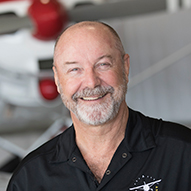For a flight school, the quality of CFIs on staff can be a critical selling point. Students are drawn to flying with men and women they perceive as being experienced, professional, and knowledgeable.
Aerosim Flight Academy in Sanford, Florida, knows this. As a flight school it specializes in accelerating a flight student’s path to the airline level, and then it extends that same philosophy to its own CFIs. Aerosim sees real value in fostering a work environment that creates a path for its CFIs to move on and move up as quickly and efficiently as possible. That’s in keeping with the original concept behind the formation of the school. “It was started by an airline pilot with a goal of creating airline pilots,” said Leon Moberg, a retired Marine aviator who now fills the senior director of operations chair at Aerosim.
Part of that process is an acceptance of the concept of mentoring. Not only are CFIs employed to teach and mentor their students, but Aerosim CFIs can benefit from mentors as well. “We like to take the older, more senior instructors, to help the young instructors,” explained Matthew Lambert, Aerosim’s director of flight operations. Lambert started at Aerosim in 2009 and has worked his way up through the ranks to his current position. He knows the ropes. “They can share their experience and knowledge. Younger CFIs really take to it.”
This practice is not significantly different from the system used at the airlines, where captains mentor first officers in preparation for the day when they are expected to move to the left seat. The process is not a secret. As students become aware of CFIs helping CFIs, that may foster a sense of brand loyalty and a strong desire to become CFIs at Aerosim upon graduation, rather than simply accepting a CFI position wherever one is available.
This process assures the student that he or she is flying with a CFI who not only knows how to fly, but also has the support and guidance he or she needs to become a better teacher. Ultimately, both the CFI and the student win.
“When a CFI arrives he’s handed an ops manual and a standards manual,” says Lambert. This assures that each CFI at Aerosim is teaching each task in the same manner as his or her peers. The benefit of standardization to students is they can move from flying with an instructor to flying with a check pilot with the confidence that their instructor taught them the right material in the right way. It helps the CFI too; as Lambert said, “That’s a benefit to any CFI. When you walk in you know what’s expected of you on a daily basis.”
With more experienced CFIs supporting less experienced CFIs, and all of them using standardized methods to ensure safety and efficiency, the result tends to be a professional environment filled with happy CFIs and motivated students. That&rsuqo;s a goal any flight school business would do well to set their sights on.



